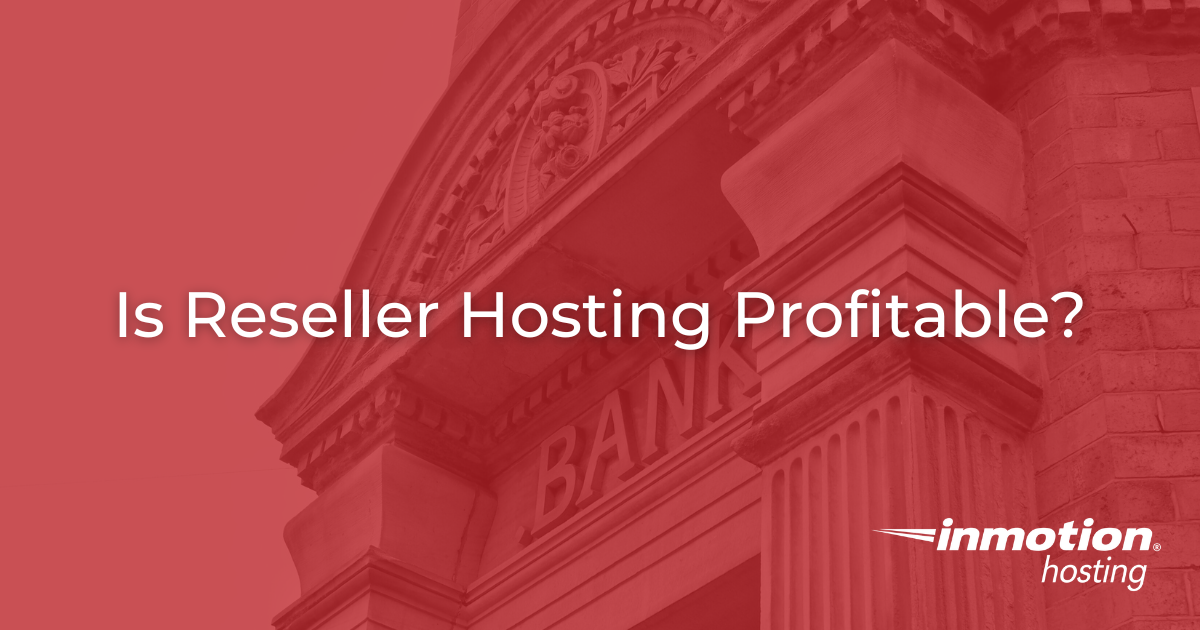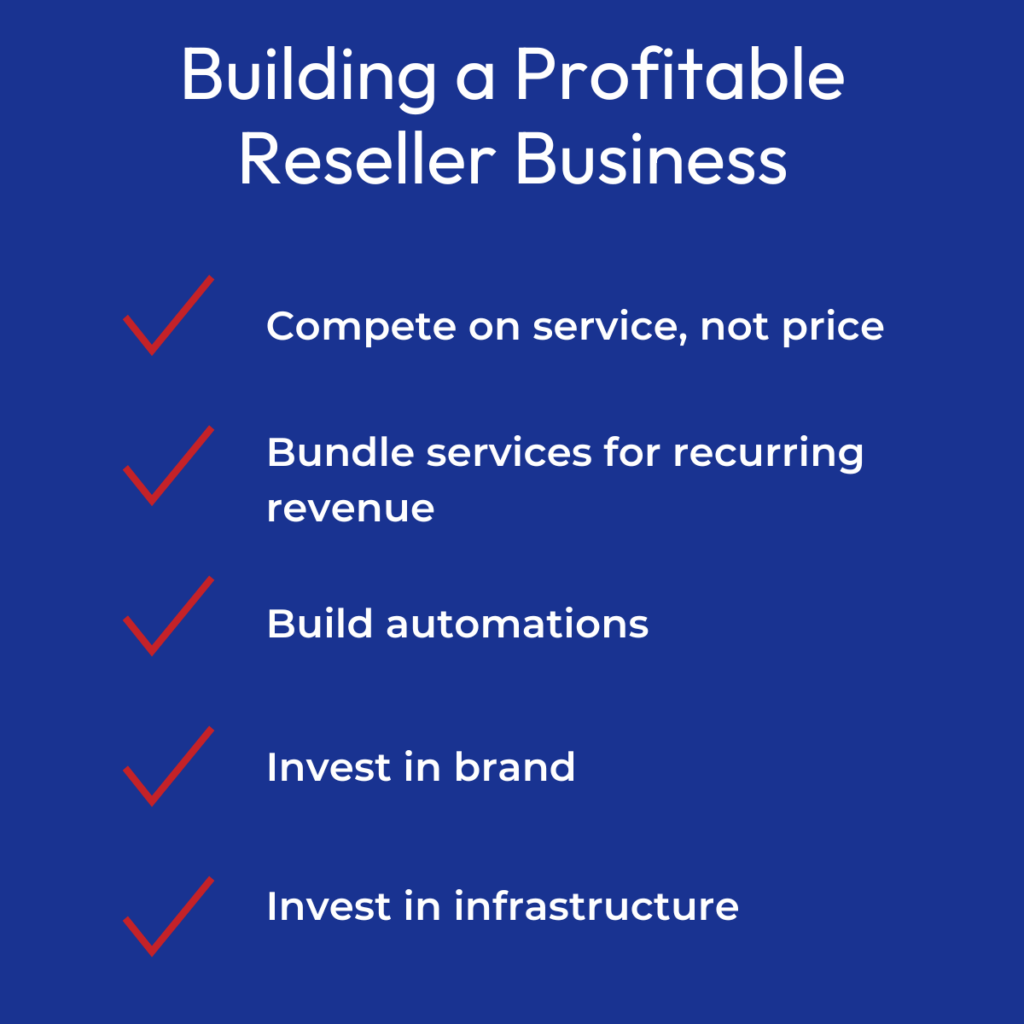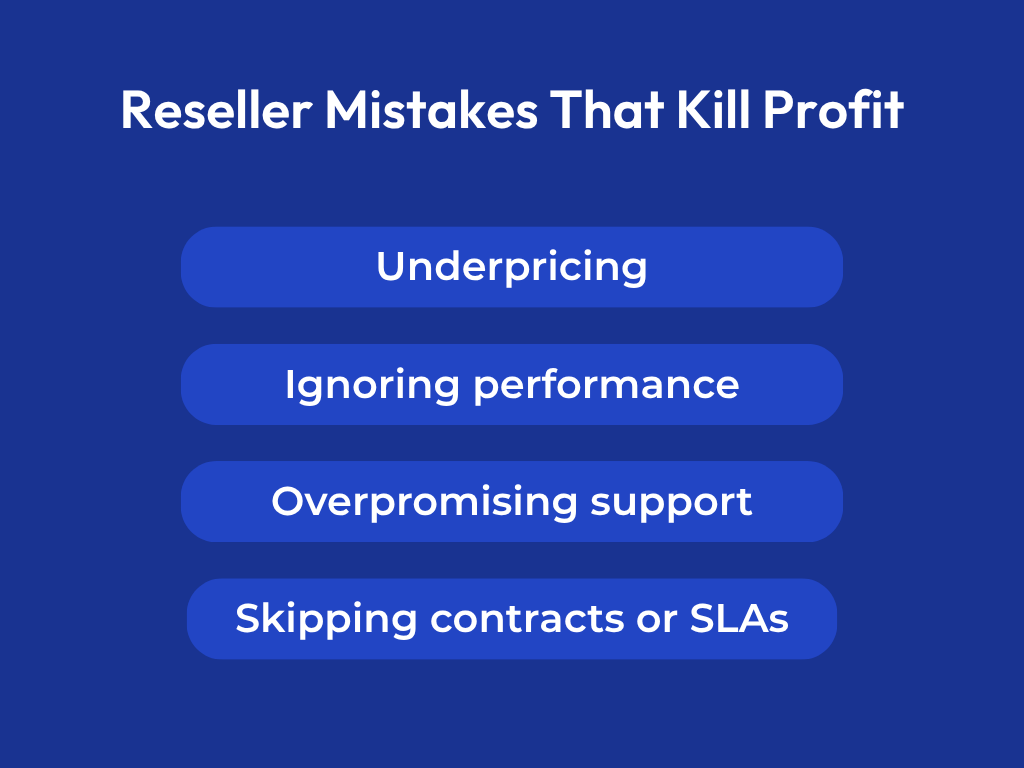Is Reseller Hosting Profitable? | InMotion Hosting

Reseller hosting is profitable when you treat it like a business, not a side hustle. By reselling hosting under your own brand, you can build predictable monthly revenue, strengthen client relationships, and scale with automation tools like cPanel and WHMCS. The key to profitability lies in bundling services, retaining clients, and partnering with a provider that delivers NVMe-powered performance and real human support. With the right foundation, reseller hosting can grow from an extra income stream into a sustainable business.
In a world where at least 73% of even small businesses rely on a website, more professionals are asking a simple question: Is reseller hosting profitable?
The short answer is yes, when you treat it like a business. Reseller hosting gives you the power to buy hosting resources wholesale, repackage them under your own brand, and sell them for recurring monthly income. Whether you’re a web designer, agency owner, or freelancer, it’s a proven way to create predictable revenue while strengthening client relationships.
Communities like WebHostingTalk have thousands of discussions from successful resellers sharing real-world strategies and challenges.
But profitability doesn’t happen automatically. It depends on how you position your services, the clients you serve, and the tools that support your operations. This guide breaks down how reseller hosting works, what makes it profitable, and the strategies that turn it into a long-term business, not just a side hustle.
Understanding the Reseller Hosting Model
At its core, reseller hosting allows you to rent server resources from a hosting provider and divide them into smaller, branded packages for your clients. You manage their accounts, billing, and services. This can happen while your provider handles the heavy lifting like server maintenance, uptime, and hardware performance.
Think of it as leasing an apartment building. You don’t build the structure; you rent space from the developer, furnish each unit, and sublease it to tenants. Your clients get convenience, reliability, and personal support, while you earn income from each account.

White Label Hosting: Your Brand, Your Business
The biggest advantage of reseller hosting is white labeling. You operate under your own name, with custom nameservers, dashboards, and email notifications. Your clients never see your hosting provider’s branding. This independence allows you to build credibility, increase retention, and scale your reputation alongside your revenue.
How Profitability Works in Reseller Hosting
A. Core Revenue Streams
Reseller hosting offers multiple income sources beyond just hosting plans:
Hosting packages: Your main recurring revenue. You buy resources at a wholesale rate and set your own retail prices.
Domain registration and SSL sales: Add convenience while increasing your margin per client.
Maintenance retainers: Offer ongoing updates, backups, and security monitoring.
Add-ons and upgrades: Email hosting, premium caching, or priority support can all boost monthly revenue.
B. Typical Profit Margins
Profit margins depend on your pricing strategy and how you package services. A typical reseller plan might cost $30–$50 per month and host 10–20 clients. If each client pays $20 per month, that’s $200–$400 in recurring revenue with $150–$350 in profit.
As your client base grows, your margins expand, especially when you automate billing and support.
C. The Factors That Influence Profitability
Several elements directly affect your bottom line:
Infrastructure performance: Fast NVMe storage improves site speed and client satisfaction.
Uptime and reliability: Downtime leads to cancellations; a 99.9% uptime SLA builds trust.
Scalability: The easier you can upgrade plans, the faster you can grow without migration stress.
Customer retention: Loyal clients mean steady income and reduced marketing costs.
Building Profitability: Laying the Foundation
Profitability doesn’t come from luck. It comes from structure, strategy, and a clear understanding of what your clients actually value. The resellers who succeed are the ones who’ve figured out how to build recurring revenue, protect their time, and position themselves as trusted partners rather than commodity vendors.
Stop Competing on Price Alone
The fastest way to burn out as a reseller is to compete with budget hosts on price. You’ll never win that race, and even if you do, you’ll attract clients who churn the moment they find someone a dollar cheaper.
Instead, compete on service. When a potential client asks about your rates, shift the conversation to what they’re actually getting: blazing-fast performance from NVMe-powered servers, real human support when something goes wrong, and personalized onboarding that takes the technical burden off their plate.
When you position hosting as part of a complete solution, clients stop comparing your rates and start evaluating your value.
Build Recurring Revenue Through Bundled Services
One-time projects pay the bills today. Recurring revenue pays them forever. The most profitable resellers don’t just sell hosting, they bundle it with services that create ongoing value.
Think about it this way: a designer who charges $1,000 to build a site can add $30 to $50 per month in hosting, maintenance, and updates. That’s an extra $360 to $600 per year, per client, without building another site. Over time, those monthly fees compound into stable, predictable income that smooths out the feast-or-famine cycle most freelancers face.
Bundle hosting with maintenance plans. Add SEO monitoring and content updates. Offer security and backup packages. The key is creating a service clients need consistently, not just once.
Automate Everything You Can
Manual work is the silent profit killer. Every hour you spend provisioning accounts, sending invoices, or routing support tickets is an hour you’re not spending on growth.
This is where automation tools like cPanel/WHM and WHMCS become essential. They handle account setup, billing, renewal reminders, and ticket management. These are all the operational tasks that used to eat up your day. Automation doesn’t just save time. It protects your margins and lets you scale without hiring a team.
Invest in Your Branding
Clients don’t just buy hosting. They buy confidence. And confidence comes from working with a brand that feels professional, consistent, and trustworthy.
White-label tools let you control that experience. Set up custom nameservers so emails come from your domain, not your provider’s. Add your logo to client dashboards. Send branded invoices. Every touchpoint should reinforce that they’re working with you, not some faceless hosting company.
This consistency builds credibility. And credibility drives repeat business.
Invest in Your Infrastructure
Your business is only as reliable as the infrastructure beneath it. If your provider’s servers are slow, unstable, or maxed out, your clients feel it. Unfortunately they’ll blame you, not the hosting company they’ve never heard of.
This is why choosing a reseller partner matters. Look for NVMe storage, which delivers data faster than traditional drives. Make sure accounts are isolated so one client’s traffic spike doesn’t tank another’s performance. And confirm that you can scale instantly when a client’s needs grow, without downtime or migrations.

Sustaining Growth: Optimizing for the Long Term
Once you’ve laid the foundation, profitability becomes about optimization and scale. The tactics that get you to your first 10 or 20 clients won’t automatically carry you to 50 or 100. Here’s how to build a business that compounds over time.
Retention Is More Profitable Than Acquisition
Here’s the math that matters: acquiring a new client costs five to seven times more than keeping an existing one. Yet most resellers spend all their energy chasing new business while their existing clients quietly drift away.
Flip that script. Focus on proactive support. Send performance reports that show clients how their sites are doing. Recommend optimization upgrades before problems surface. Offer loyalty discounts for long-term clients. Small gestures of attention make clients feel valued, and valued clients stick around.
Every client you retain compounds your monthly recurring revenue. And every month they stay is another month you’re not scrambling to replace them.
Track What Drives Decisions
You can’t improve what you don’t measure. The most profitable resellers track a handful of metrics that reveal exactly where their business stands and where it’s headed.
Monthly Recurring Revenue shows whether your income is predictable or volatile. Average Revenue Per Client reveals if you’re leaving upsell opportunities on the table. Churn Rate tells you if clients are leaving, and if so, how fast. Support Hours per Client exposes whether some accounts are eating your time without returning enough value.
These numbers don’t just diagnose problems. They guide decisions. They show you which clients to focus on, which services to bundle, and where to adjust pricing to protect your margins.
Position Yourself as a Partner, Not a Vendor
Here’s the difference between a vendor and a partner: a vendor sells access to a server. A partner guides digital growth.
When you offer insights on site performance, suggest SEO improvements, or help clients think through content strategy, you’re no longer just the hosting person. You’re a trusted advisor. And clients pay more (and stay longer) for expertise than they ever will for access alone.
This shift in positioning changes everything. It turns hosting from a price-sensitive commodity into a strategic relationship.
Lean on Real Human Support
One of the biggest advantages of partnering with InMotion Hosting is our 24/7 real human support. When something breaks at 2 a.m., you’re not stuck troubleshooting backend server issues. You’ve got a technical partner who resolves problems quickly, so you can focus on keeping your clients happy.
This kind of support doesn’t just save time. It protects your reputation. When clients know you can solve problems fast, they trust you more. And trust is the foundation of retention.
Reinvest in What’s Working
As your revenue stabilizes, resist the urge to pocket every dollar. The resellers who scale are the ones who reinvest strategically: in marketing that brings in better clients, in upgraded plans that support more traffic, in education that sharpens their skills, and in partnerships that open new channels.
Small, smart reinvestments build momentum. They turn a stable business into a growing one, and a growing business into one that can weather changes in the market.
Profitability isn’t about doing more. It’s about doing the right things consistently, and building a foundation that compounds over time.
Real-World Profit Example
Let’s look at a simple model:
- You purchase a reseller plan for $40/month.
- You host 15 clients at $25 each.
- Monthly income: $375.
- Net profit: $335/month or nearly $4,000 annually, before upsells.
Now imagine scaling to 50 clients. At the same pricing, you’d generate $1,250/month in recurring profit, enough to fund new projects or marketing expansion. And because your infrastructure and billing systems scale automatically, your workload doesn’t increase proportionally.
Common Mistakes That Kill Profit
Even profitable models can lose money if managed poorly. Avoid these pitfalls:
1. Underpricing
Charging too little erodes perceived value and leaves no room for reinvestment. Price for quality and service, not competition.
2. Ignoring Performance
Slow sites lead to refunds and cancellations. Always choose infrastructure that’s engineered for speed.
3. Overpromising Support
Set clear expectations for support levels. Use automation and escalation processes to prevent burnout.
4. Skipping Contracts or SLAs
Document terms for uptime, support, and billing. Clarity builds professionalism and avoids disputes.

A Profitable Path Built on the Right Foundation
So, is reseller hosting profitable?
Absolutely, but not by accident. Profitability comes from treating this like a partnership business, not a product arbitrage play. The resellers who succeed bundle services, automate ruthlessly, and focus on retention over volume. They understand that keeping a client is cheaper and more profitable than replacing one.
But none of that matters if your infrastructure can’t keep up. Your clients will never see your hosting provider’s dashboard, but they’ll absolutely feel it if the servers are slow or support disappears when something breaks.
InMotion Hosting’s reseller plans give you NVMe-powered performance, 99.9% uptime backed by an SLA, real human support 24/7, and the ability to scale without hitting walls. It’s infrastructure that won’t become the bottleneck in your growth.
If you’re ready to build something sustainable, start with a foundation that won’t let you down. The profitability is there. You just have to build it on something solid.


